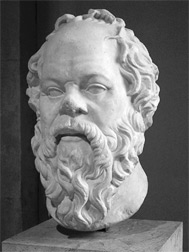Socrates, the lustrous lodestar
 Even those who have a nodding acquaintance of the great Greek
philosopher Socrates (C.470-390BCE) might agree that there will never be
another philosopher like him in the west or east. Although Socrates
lived in ancient Greece long before Jesus Christ, his powerful presence
is felt in society even in the 21st century. Many other philosophers
have come and gone but he shines like a lodestar that others want to
follow. What made him such a magnetic personality remains shrouded in
mystery. Even those who have a nodding acquaintance of the great Greek
philosopher Socrates (C.470-390BCE) might agree that there will never be
another philosopher like him in the west or east. Although Socrates
lived in ancient Greece long before Jesus Christ, his powerful presence
is felt in society even in the 21st century. Many other philosophers
have come and gone but he shines like a lodestar that others want to
follow. What made him such a magnetic personality remains shrouded in
mystery.
Very little is known about Socrates’s life except for the fact that
he was married to Xanthippe and they had three sons. When he was
sentenced to death at the age of 70, his eldest son was not yet 20 and
the youngest was a small child. Xanthippe had aristocratic connections.
Young Socrates was apprenticed as a sculptor but he did not work
regularly. He lived off a modest inheritance from his father. Unlike
other Sophists he never accepted payment for teaching philosophy.
However, he accepted gifts from wealthy admirers occasionally.
Socrates led a simple life not wearing shoes and using only an old
coat. He was a physically powerful man who spent his time wandering
about the marketplace. His only “job” was asking philosophical
questions. Although Socrates hobnobbed with politically powerful and
wealthy men, he never sought political favours.
Temper
Socrates’s questioning was sometimes so intense that sometimes his
opponents quarrelled with him. But he never lost his temper. Once
Alcibiades offered him a large plot of land to put up a house. However,
Socrates said, “Suppose, then, I wanted shoes and you offered me a whole
hide to make a pair, would it not be ridiculous of me to take it?”
|

Socrates: Either acquit me or not; but whichever you do,
understand that I shall never alter myways, not even if I
have to die many times. |
He ate and drank moderately and never desired to have more because he
had few wants. Before his marriage somebody asked him whether he should
marry. Socrates said, “Whichever you do you will repent it.”
Socrates was perhaps the most powerful and inspiring philosopher of
the west. Tenzin Gyatso, the 14th Dalai Lama of Tibetan Buddhism called
Socrates “an enlightened man.” Although he never wrote books on
philosophy, he taught Plato, one of the eminent philosophers of the
western tradition. The main source of his philosophy is his dialogues
with Plato and the anecdotes.
Values
If Socrates was alive today, he will definitely appeal to the younger
generation because he stood for some values and clearly against others.
Such personal integrity is rarely seen today. We have very few men of
Socrates’s calibre. While his fellowmen were running a rat-race for
power and prestige, Socrates upheld courage, decency, respect for
justice and abhorred cut-throat competition. His guiding motto “Know
thyself” has echoed and re-echoed throughout human history. Even the
Buddha stressed the importance of knowing oneself.
Socrates was not a well-dressed good-looking man. His physical
features were abominable, to say the least. It is said that he was an
“extraordinarily ugly” man. He had a broad and flat nose, protruding
eyes, thick lips and a large belly. However, his penetrating questions
shocked his listeners. No wonder that some of his contemporaries called
him an “electric eel.”
Despite his ugly appearance, Socrates was a good-natured man who had
a hierarchy of moral values. He said that the true self was not the body
but the soul (psyche). According to him true beauty is inner beauty.
Fearlessness
Another great quality of Socrates is his fearlessness. He fought
valiantly against Spartans. In a military campaign he walked about
barefoot on the icy winter ground of Thrace. Socrates says that
self-control leads to pleasure. When we do not have self-control,
indulge in over eating, drinking and other pleasures, we become animals.
The trial and death of Socrates remind us that we should re-examine
our collective conscience. When he was brought to trial for “not
worshipping the gods of the State”, his prosecutor demanded death
penalty on him.
While he was awaiting death in prison, he was offered the opportunity
to escape but he refused to do so and preferred to drink the cup of
hemlock. His last words were “Crito, I owe a cock to Asclepius; you will
remember to pay the debt?”
|

